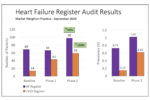More and more nurses in primary care are involved in monitoring international normalised ratio (INR) levels and advising patients on warfarin doses as anticoagulation clinics move out of secondary care and into primary care. In this article we explore why warfarin is prescribed, how to monitor patients on the drug and what to look out for in terms of interactions with prescribed medicines, over-the-counter drugs and foods. We also need to be able to advise on lifestyle interventions that go hand-in-hand with taking warfarin.






















